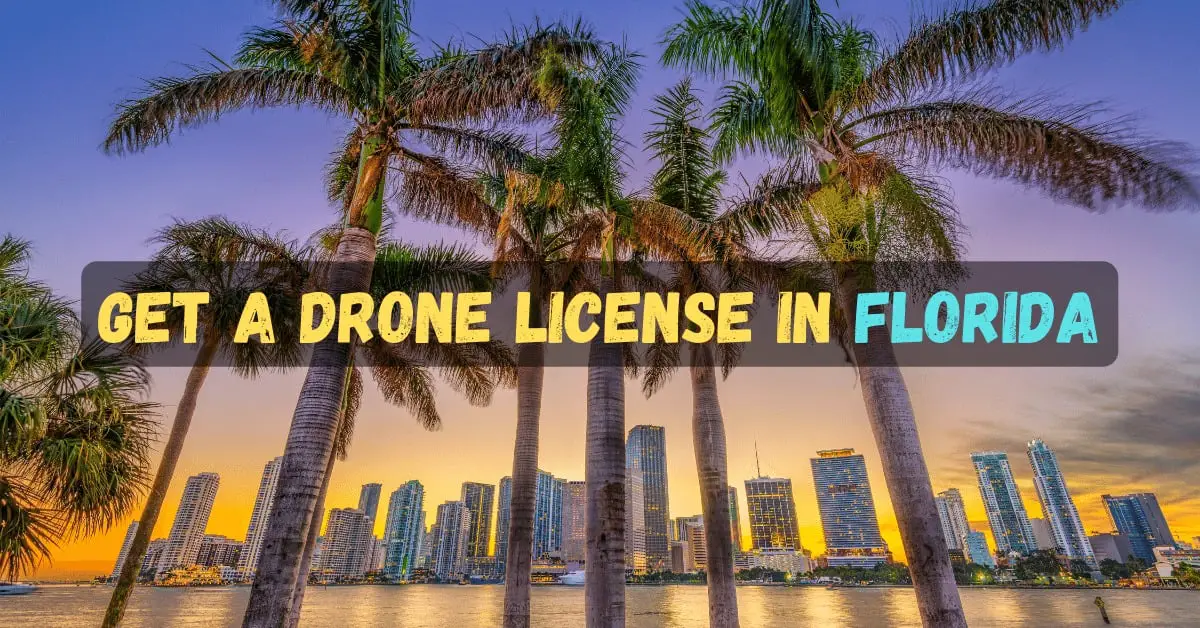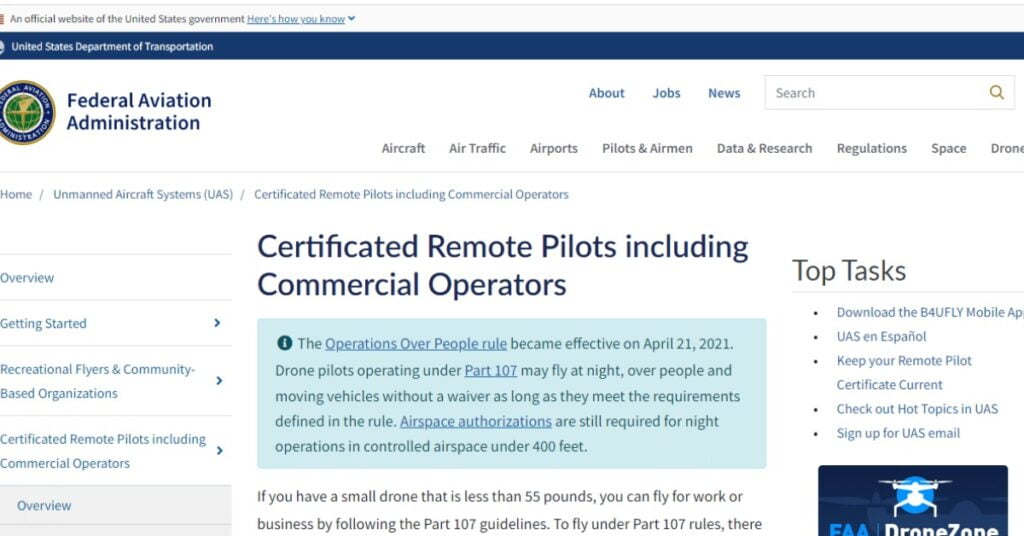How to Get a Drone License in Florida? | A Comprehensive Guide.

How to Get a Drone License in Florida?
To fly a drone commercially in Florida, you must obtain a drone license. This license is issued by the Federal Aviation Administration (FAA) and requires you to pass their Part 107 Remote Pilot aeronautical knowledge test.
In this article, we’ll take you through the steps you need to follow to obtain your drone license in Florida. We’ll explain the different types of licenses available, what you can expect on the FAA knowledge test, and how to prepare for it.
We’ll also cover the regulations you must follow when flying a drone in Florida, including the areas where you may need a permit to fly. So, if you want to become a licensed drone pilot in Florida, keep reading!
What is a Drone License, and Why is it Necessary in Florida?
Drones, also known as uncrewed aerial vehicles (UAVs), have become increasingly popular in recent years, and their use in Florida is no exception. A drone license, also known as a remote pilot certificate, is a legal requirement for anyone who wants to fly a drone commercially in Florida.
In the United States, the Federal Aviation Administration (FAA) is responsible for regulating drone use, and they require anyone flying a drone for commercial purposes to obtain a drone license.
This license ensures that drone pilots have the necessary skills and knowledge to operate drones safely and legally.
Without a drone license, you can face legal consequences, such as fines or criminal charges. Furthermore, insurance companies may refuse to cover any damages or injuries from an unlicensed drone operation.
Now that we know why a drone license is necessary, let’s dive into what it entails and how to obtain one.
What is a drone license?
A drone license, or remote pilot certificate, permits you to operate a drone for commercial purposes. The FAA requires this license under their Part 107 rules.
What are commercial purposes?
Commercial purposes include any drone operation related to making money or business. For instance, if you use a drone to take aerial photographs or videos for real estate listings, you are considered flying for commercial purposes.
Why is it essential to obtain a drone license in Florida?
Obtaining a drone license is crucial for anyone who wants to fly a drone commercially in Florida. It ensures that you have the necessary knowledge and skills to operate a drone safely and legally, and it also protects you from legal and financial consequences.
By obtaining a drone license, you can demonstrate to your clients or employer that you are a professional and knowledgeable drone pilot.

What are the Different Types of Drone Licenses Available in Florida?
To fly a drone commercially in Florida, you must obtain a drone license. However, different types of claims are available depending on the drone operation you’ll be conducting. Here’s a breakdown of the different kinds of drone licenses available in Florida:
Remote Pilot Certificate:
The most common type of drone license is the Remote Pilot Certificate, which allows you to fly drones for commercial purposes.
To obtain this license, you must pass the FAA Part 107 Remote Pilot aeronautical knowledge test. This license is valid for two years and can be renewed by passing a recurrent knowledge test.
Public Aircraft Operator Certificate:
If you fly a drone for a government agency, such as law enforcement or public safety, you’ll need a Public Aircraft Operator Certificate. This license requires you to have a pilot’s license and meet other specific requirements.
Special Airworthiness Certificate:
If you’re flying a drone for research and development purposes or to perform specific tasks, you may need a Special Airworthiness Certificate. The FAA issues this certificate and requires you to meet specific safety requirements.
Experimental Certificate:
The Experimental Certificate is a particular type of license that allows you to fly drones for experimental purposes. Manufacturers typically use this license to test new drones or researchers to conduct experiments.

Obtaining a drone license in Florida depends on the type of drone operation you’ll be conducting. Whether you’re a commercial drone pilot or a researcher, research the type of license you need and meet all of the FAA’s requirements.
How Do I Obtain a Remote Pilot Certificate in Florida?
If you want to operate a drone for commercial purposes in Florida, you’ll need to obtain a Remote Pilot Certificate from the FAA. Here’s a step-by-step guide to getting your Remote Pilot Certificate:
Determine if you’re eligible to take the FAA Remote Pilot exam.
To qualify for the Remote Pilot test, individuals must meet the following criteria: be a minimum of 16 years of age, and possess the ability to comprehend, speak, write, and read the English language. You must also not have any physical or mental condition that would interfere with your ability to operate a drone safely.
Study for the FAA Remote Pilot exam
Once you’ve determined you can take the exam, it’s time to start studying. The FAA provides a free study guide that covers all the topics you’ll need to know for the exam. You can find other study materials online or enroll in a training course.
READ MORE: Can you fly a drone in Breckenridge, Colorado?
Schedule your FAA Remote Pilot exam.
You can schedule your exam through the FAA’s website when you feel confident in your knowledge. You’ll need to create an account and pay the exam fee of $160.
Take the FAA Remote Pilot exam.
On the day of your exam, you’ll need to bring two forms of identification, including one government-issued photo ID. The exam has 60 multiple-choice questions; you’ll have 2 hours to complete. You’ll need to score at least 70% to pass.
Receive your Remote Pilot Certificate
You’ll receive a Temporary Remote Pilot Certificate for 120 days if you pass the exam. The FAA will mail your permanent certificate to you within that time frame.
It’s important to note that once you obtain your Remote Pilot Certificate, you must follow all FAA regulations and guidelines for operating a drone commercially in Florida.

It includes registering your drone, flying in approved areas, and maintaining your certificate with regular knowledge testing.
With your Remote Pilot Certificate, you can legally operate a drone for commercial purposes in Florida, opening up various opportunities for your business or hobby.
What Should I Expect on the FAA Knowledge Test for Drone Pilots in Florida?
Once you’ve submitted your application for the FAA Part 107 Remote Pilot aeronautical knowledge test, it’s time to start preparing for the exam.
This test is a multiple-choice exam that will evaluate your understanding of FAA regulations, operating procedures, and aeronautical concepts. Here are some of the things you can expect on the FAA knowledge test for drone pilots in Florida:
Regulations and Operating Procedures
One of the main areas that the FAA knowledge test will cover is regulations and operating procedures. You’ll need to be familiar with the FAA’s rules and regulations regarding drone operations, including airspace restrictions, flying near airports, and flying over people.
You’ll also need to understand the pre-flight inspection procedures and the emergency procedures you must follow if something goes wrong during your flight.
Weather and Weather Patterns
Another area that the FAA knowledge test will cover is weather and weather patterns. You’ll need to be able to read and interpret weather forecasts and understand how weather patterns can affect your drone’s flight. It includes understanding how to fly in windy, rainy, or low-visibility situations.
Aeronautical Concepts
The FAA knowledge test will also test your knowledge of basic aeronautical concepts, such as aerodynamics and the principles of flight.
You’ll need to understand how the different components of your drone work together to keep it in the air, as well as how to operate your drone in various flight modes safely.

Navigation and Chart Reading
Finally, you’ll need to be able to read and understand aviation charts and maps. It includes understanding the different types of airspace, navigating within them, and how to read charts, and determine your drone’s position using GPS.
Overall, the FAA knowledge test for drone pilots in Florida can seem daunting, but with the proper preparation and study, you can easily pass the exam.
Take your time studying and preparing for the exam, and don’t hesitate to reach out to other licensed drone pilots or resources for help along the way.
How Can I Prepare to Pass the FAA Knowledge Test on My First Attempt in Florida?
Preparing for the FAA knowledge test can be overwhelming, but with the right approach, you can pass it on your first attempt. Here are some tips to help you prepare for the test and boost your chances of success:
Study the FAA’s Remote Pilot-Small Unmanned Aircraft Systems Airman Certification Standards (ACS). The ACS outlines the knowledge areas and tasks you must be familiar with to pass the FAA knowledge test. Make sure to review it thoroughly before taking the test.
Use study materials: There are plenty of resources available to help you prepare for the FAA knowledge test, including study guides, online courses, and practice tests. Consider using one or more of these materials to supplement your studying.
Practice with online tools: There are many online tools available that can help you prepare for the FAA knowledge test, including practice tests, flashcards, and quizzes. Use these tools to help you test your knowledge and identify areas you need to focus on.
Get hands-on experience: While the FAA knowledge test focuses on theoretical knowledge, it’s also essential to have practical experience operating a drone. Try to get as much hands-on experience as possible to help you understand the concepts better.
Take care of yourself – Preparing for a test can be stressful, but ensuring you’re in the best possible state of mind when taking the FAA knowledge test is essential. Get enough rest, exercise regularly, and eat a healthy diet to help you feel your best.
What Regulations Do I Need to Follow When Operating a Drone in Florida?
Flying a drone can be a fun and exciting hobby, but it’s important to remember that regulations are in place to ensure everyone’s safety. If you’re planning on operating a drone in Florida, here are some rules you need to follow:
Stay Away from People and Buildings
When flying your drone in Florida, staying away from people and buildings is essential. According to the FAA, drones should not be flown over people who are not directly involved in the operation of the drone, and they should not be flown over buildings or other structures.
Follow the FAA’s Part 107 Rules
As mentioned, if you’re flying a drone for commercial purposes in Florida, you must follow the FAA’s Part 107 rules.
It includes passing the FAA Part 107 Remote Pilot aeronautical knowledge test and obtaining your drone license. Review the Part 107 rules before you fly your drone to avoid violations.
Keep Your Drone in Your Line of Sight
When flying your drone in Florida, always keep it in your line of sight. You should be able to see your drone without using binoculars or other equipment.
Keeping your drone in your line of sight helps ensure that you’re flying it safely and within the regulations.
READ MORE: Can you fly a drone in Portugal?
Fly During the Day and in Good Weather Conditions
The FAA requires that drones be flown during the daytime and in good weather conditions. It ensures you can see your drone and avoid any potential accidents. If you’re flying your drone in Florida, check the weather forecast before you take off.
Respect Others’ Privacy
When flying your drone in Florida, it’s important to respect others’ privacy. Avoid flying your drone over private property without the owner’s permission, and avoid filming or taking pictures of people without their consent.
Avoid Flying in Restricted Airspace
When flying your drone in Florida, avoid flying in restricted airspace. It includes areas around airports and military bases. Check for any Temporary Flight Restrictions (TFRs) that may be in effect before flying your drone.
Fly Below 400 Feet
It ensures they do not interfere with human-crewed aircraft or other airspace users. If you’re flying your drone in Florida, keep it below 400 feet.
Register Your Drone with the FAA
If your drone weighs over 0.55 pounds, register it with the FAA before flying it in Florida. The registration process is quick and easy, and it helps ensure that you’re flying your drone legally.
Once you’ve registered your drone, mark it with your registration number before taking off.
Wondering where to fly your drone legally in Florida? Check out our guide to drone laws and restrictions in Destin.
How Do I Renew and Maintain My Florida Drone License?
Congratulations, you’ve obtained your drone license in Florida! But did you know that your license needs to be renewed periodically? Here’s what you need to know to keep your drone license up-to-date.
Renewing Your Florida Drone License
Your drone license is valid for two years from the date of issue. To renew it, you’ll need to retake and pass the FAA Part 107 Remote Pilot aeronautical knowledge test, just like you did when you first obtained your license.
You can schedule your test on the FAA website and prepare for it using the same study materials you used the first time. Ensure you allow enough time to study and take the test before your license expires.
Maintaining Your Florida Drone License
In addition to renewing your license every two years, you’ll also need to ensure you follow all of the FAA’s regulations for drone pilots. It includes staying up-to-date on any changes to the rules and completing regular training and education courses as required by the FAA.
One of the easiest ways to stay up-to-date is by subscribing to the FAA’s email notifications. This way, you’ll receive timely updates on any changes to regulations or procedures that could affect your license.
You can also join drone pilot associations or attend drone events to network with other pilots and stay informed about industry news and trends.
Renewing and maintaining your Florida drone license is crucial to continue flying drones legally and safely. Ensure you know the renewal deadlines and stay up-to-date on any FAA regulations changes.
By doing so, you’ll be able to enjoy the many benefits of being a licensed drone pilot in Florida for years to come.

Important FAQs
How much does it cost to get a drone license in Florida?
What is the cost of a commercial drone license?
Do I need a drone license to fly a drone?
How much does it cost to get a drone license in Florida?
Can I take a course to prepare for the drone license test?
What does the drone license test involve?
Are there any no-fly zones for drones in Florida?
Do I need a license to fly a drone in Florida?
Final Thoughts
Becoming a licensed drone pilot in Florida can open up opportunities for you. From aerial photography to surveying and mapping, many industries rely on drones for their operations.
However, it’s important to remember that flying a drone commercially involves much responsibility. Obtaining and maintaining your drone license is just one part of that responsibility.
As a licensed drone pilot in Florida, you’ll need to follow the FAA’s regulations for drone pilots, including obtaining any necessary permits and keeping up-to-date on changes to the rules.
You’ll also need to prioritize safety and ensure that you’re not putting people or property at risk while flying your drone.
By following the guidelines outlined in this article, you’ll be well on your way to obtaining your drone license and becoming a responsible and skilled drone pilot.
With your license in hand, you’ll be able to explore the many possibilities of drone technology and contribute to the growth of this exciting industry.
Want to See Florida:
How to Remove DJI Height Limit? (Step-by-step Guide).
“Wanna take your DJI to new heights? 🚁 Check out our step-by-step guide to unlock the sky’s limit! Don’t miss this freedom-boosting tutorial!”








